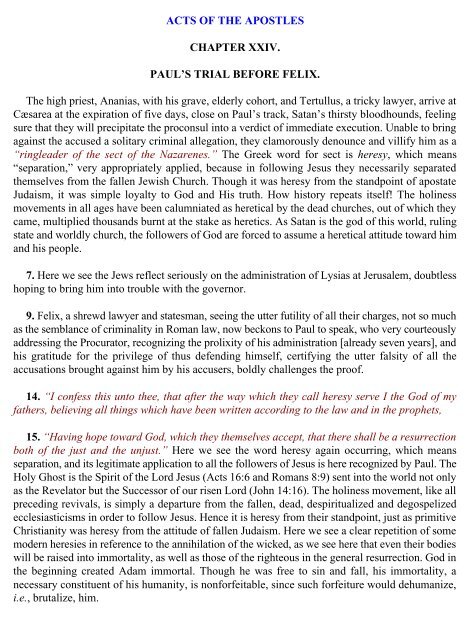Godbey's Commentary - Acts - Romans - Enter His Rest
Godbey's Commentary - Acts - Romans - Enter His Rest
Godbey's Commentary - Acts - Romans - Enter His Rest
You also want an ePaper? Increase the reach of your titles
YUMPU automatically turns print PDFs into web optimized ePapers that Google loves.
ACTS OF THE APOSTLES<br />
CHAPTER XXIV.<br />
PAUL’S TRIAL BEFORE FELIX.<br />
The high priest, Ananias, with his grave, elderly cohort, and Tertullus, a tricky lawyer, arrive at<br />
Cæsarea at the expiration of five days, close on Paul’s track, Satan’s thirsty bloodhounds, feeling<br />
sure that they will precipitate the proconsul into a verdict of immediate execution. Unable to bring<br />
against the accused a solitary criminal allegation, they clamorously denounce and villify him as a<br />
“ringleader of the sect of the Nazarenes.” The Greek word for sect is heresy, which means<br />
“separation,” very appropriately applied, because in following Jesus they necessarily separated<br />
themselves from the fallen Jewish Church. Though it was heresy from the standpoint of apostate<br />
Judaism, it was simple loyalty to God and <strong>His</strong> truth. How history repeats itself! The holiness<br />
movements in all ages have been calumniated as heretical by the dead churches, out of which they<br />
came, multiplied thousands burnt at the stake as heretics. As Satan is the god of this world, ruling<br />
state and worldly church, the followers of God are forced to assume a heretical attitude toward him<br />
and his people.<br />
7. Here we see the Jews reflect seriously on the administration of Lysias at Jerusalem, doubtless<br />
hoping to bring him into trouble with the governor.<br />
9. Felix, a shrewd lawyer and statesman, seeing the utter futility of all their charges, not so much<br />
as the semblance of criminality in Roman law, now beckons to Paul to speak, who very courteously<br />
addressing the Procurator, recognizing the prolixity of his administration [already seven years], and<br />
his gratitude for the privilege of thus defending himself, certifying the utter falsity of all the<br />
accusations brought against him by his accusers, boldly challenges the proof.<br />
14. “I confess this unto thee, that after the way which they call heresy serve I the God of my<br />
fathers, believing all things which have been written according to the law and in the prophets,<br />
15. “Having hope toward God, which they themselves accept, that there shall be a resurrection<br />
both of the just and the unjust.” Here we see the word heresy again occurring, which means<br />
separation, and its legitimate application to all the followers of Jesus is here recognized by Paul. The<br />
Holy Ghost is the Spirit of the Lord Jesus (<strong>Acts</strong> 16:6 and <strong>Romans</strong> 8:9) sent into the world not only<br />
as the Revelator but the Successor of our risen Lord (John 14:16). The holiness movement, like all<br />
preceding revivals, is simply a departure from the fallen, dead, despiritualized and degospelized<br />
ecclesiasticisms in order to follow Jesus. Hence it is heresy from their standpoint, just as primitive<br />
Christianity was heresy from the attitude of fallen Judaism. Here we see a clear repetition of some<br />
modern heresies in reference to the annihilation of the wicked, as we see here that even their bodies<br />
will be raised into immortality, as well as those of the righteous in the general resurrection. God in<br />
the beginning created Adam immortal. Though he was free to sin and fall, his immortality, a<br />
necessary constituent of his humanity, is nonforfeitable, since such forfeiture would dehumanize,<br />
i.e., brutalize, him.
















